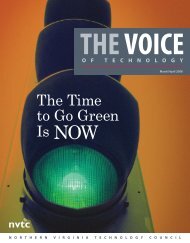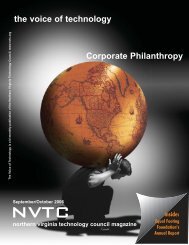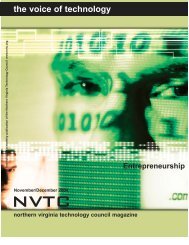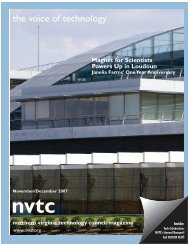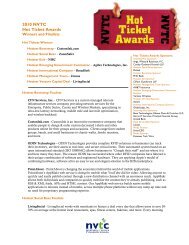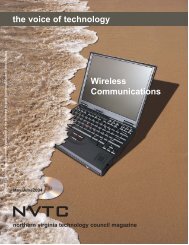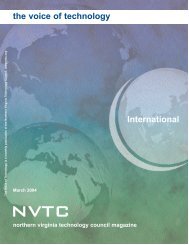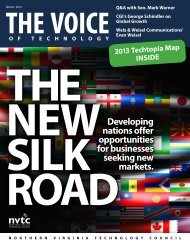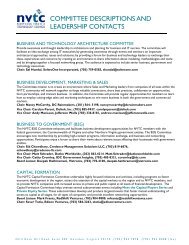Fall 2010 - Northern Virginia Technology Council
Fall 2010 - Northern Virginia Technology Council
Fall 2010 - Northern Virginia Technology Council
You also want an ePaper? Increase the reach of your titles
YUMPU automatically turns print PDFs into web optimized ePapers that Google loves.
orge the Future of Wireless<br />
p <strong>Virginia</strong> Tech Ph.D. candidate Dan DePoy, one of the<br />
graduate research assistants experimenting with the<br />
network of 48 cognitive radios, adjusts the antenna on a<br />
cognitive radio.<br />
In the Wireless@VT lab in ICTAS, the cognitive radio system<br />
enables Reed and others to implement and test their algorithms,<br />
protocols, applications and hardware technologies that support<br />
whitespace communications. Most importantly, these tests now<br />
occur in a live environment, rather than computer simulations<br />
or one-to-one radio interactions. Researchers are hard at work<br />
improving the cognitive radio’s smart engine, which drives the<br />
radio’s ability to “monitor its own performance continuously,<br />
read the radio’s outputs to determine the radio frequency, channel<br />
conditions and adjust the radio’s settings to deliver the needed<br />
quality of service,” Reed said.<br />
“The potential for development and refinement of researchbased<br />
findings through the institute’s test-bed installation is an<br />
outstanding example of the kind of impact that this institute was<br />
created to inspire and support,” according to Roop Mahajan, IC-<br />
TAS director and the James S. Tucker professor of engineering.<br />
Mahajan and a number of ICTAS researchers maintain offices<br />
at the <strong>Virginia</strong> Tech Research Center–Arlington (http://www.<br />
ncr.vt.edu/arlington/index.html), as well as in Blacksburg.<br />
This powerhouse of wireless research at <strong>Virginia</strong> Tech is attracting<br />
nearly $10 million per year in research funding. Since<br />
2005, the wireless group has received funding from the U.S. Air<br />
Force, National Institute of Justice, National Science Foundation,<br />
Office of Naval Research (ONR), U.S. Army Research Laboratory,<br />
Defense Advanced Research Project Agency (DARPA),<br />
Electronics and Telecommunications Research Institute, and<br />
other organizations.<br />
In the midst of game-changing technologies, the international<br />
concern about network security remains. Tech researchers are<br />
working on this quandary with funding from DARPA and ONR.<br />
Reed, Tamal Bose, associate director of Wireless@VT and a professor<br />
of electrical and computer engineering, Madhav Marathe<br />
of <strong>Virginia</strong> Tech’s <strong>Virginia</strong> Bioinformatics Institute, and a team<br />
of graduate students are developing a new technique for security<br />
called wireless distributed computing. The researchers said that<br />
the advanced concept will perform computationally intensive<br />
applications, such as geolocation, coordinated jamming, distributed<br />
sensing and real-time image processing.<br />
With a wireless channel between nodes, the distributed<br />
computing problem becomes very complex. Depending on the<br />
condition of the wireless channel, researchers are determining<br />
whether the complex computations to process data can be executed<br />
locally on a single radio node or in a distributed manner<br />
on a collaborative radio network such as the one in the on-campus<br />
ICTAS facility. This collaborative approach can benefit and<br />
assist radios with limited computational power, such as handheld<br />
radios, cell phones or unmanned aerial vehicles. Devices<br />
based in aerial vehicles, for instance, could form a network that<br />
captures images of ground activity and compresses the images<br />
before transmitting them to a warship.<br />
Constantly conceiving, creating and deploying new technologies,<br />
researchers at <strong>Virginia</strong> Tech are shaping the wireless<br />
wave that will dramatically alter social, cultural, economic and<br />
military landscapes the world over. nvtc<br />
This story was adapted from an article that originally appeared<br />
in the Summer 2011 issue of <strong>Virginia</strong> Tech Magazine.<br />
(http://www.vtmagazine.vt.edu/sum11/feature1.html)<br />
<strong>Fall</strong> 2011 www.nvtc.org THE VOICE OF TECHNOLOGY 31



